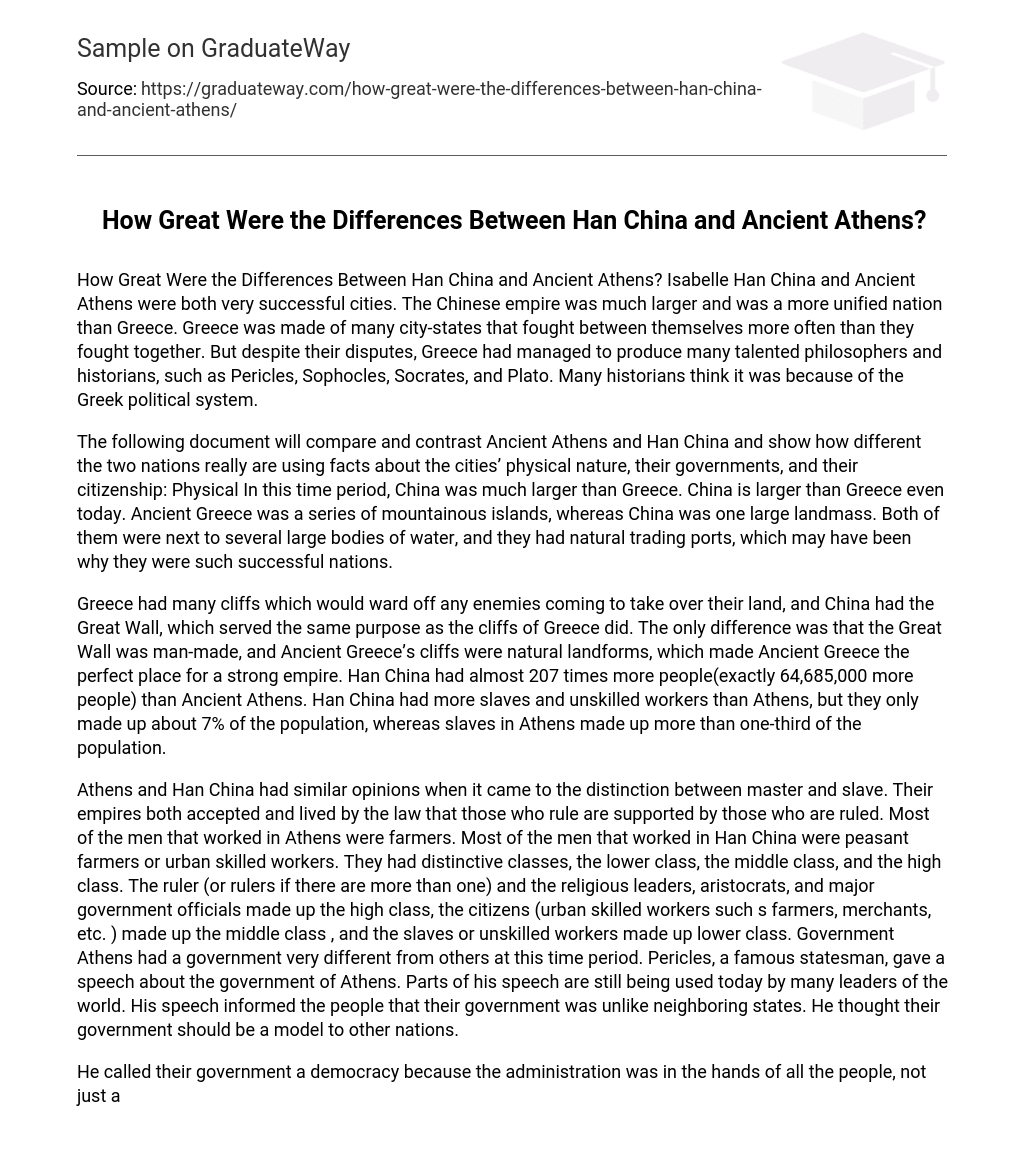China and Ancient Athens were both prosperous cities, but they differed in terms of size and political unity. China was a vast empire with strong cohesion, while Greece consisted of multiple city-states that often clashed instead of uniting. However, despite their internal conflicts, Greece fostered many brilliant thinkers such as Pericles, Sophocles, Socrates, and Plato. Historians largely credit the Greek political system for nurturing this thriving intellectual culture.
The subsequent document aims to compare and contrast Ancient Athens and Han China, highlighting the distinctiveness of the two nations through facts about their physical characteristics, governance, and citizenship. Physical: During this era, China was considerably larger than Greece, a distinction that still holds true today. While Ancient Greece consisted of a chain of mountainous islands, China was a single vast landmass. Both nations were situated near notable bodies of water and possessed natural trading ports, potentially contributing to their prosperity.
Both Greece and China had defensive structures to protect their land. Greece had natural cliffs, while China had the man-made Great Wall. Despite this difference, both provided effective barriers for their respective empires. Comparing the population sizes, Han China had significantly more people than Ancient Athens with a difference of exactly 64,685,000 individuals. While Han China also had more slaves and unskilled workers, they only accounted for 7% of the population. In contrast, slaves comprised over one-third of the population in Athens.
Both Athens and Han China held similar beliefs regarding the division between masters and slaves. Both empires embraced and adhered to the principle that rulers are backed by the ruled. The majority of laborers in Athens were farmers, while in Han China, they were primarily peasant farmers or urban skilled workers. These societies featured distinct social classes, comprising the lower class, middle class, and high class.
In ancient societies, the high class included rulers, religious leaders, aristocrats, and major government officials. The middle class consisted of urban skilled workers like farmers and merchants. The lower class comprised slaves or unskilled workers. In Athens during this era, their government had a unique structure compared to other societies. Pericles, a renowned statesman, gave a speech about the Athenian government that still influences many world leaders today. He emphasized that their government differed from neighboring states and should be seen as an example for other nations.
In his description of their government, Pericles called it a democracy because it involved the participation of all citizens, rather than just a few. According to Pericles’ Laws, every person is regarded as equal under the law when resolving personal conflicts. The selection process for public officials is determined by their abilities instead of their social class. Regardless of one’s social status or financial circumstances, they can hold public office as long as they are willing to serve the state. Our society values both freedom and openness in our public affairs and daily interactions.
In private matters, we demonstrate tolerance and strive to prevent causing offense. In public matters, we exercise caution to ensure compliance with the law, as we hold a profound respect for it. We willingly obey the individuals occupying public office, consistently, year after year. Additionally, we place great importance on laws that safeguard the oppressed and acknowledge the unwritten rules that result in shame for those who violate them. The concept of democracy emerged as a groundbreaking notion around 480 B.C. The Athenian Assembly welcomed the participation of all adult males who were free citizens.
In simpler terms, the people governed themselves. They had the freedom to discuss any practical topics, as long as they could attract an audience. The council consisted of 500 men, who were selected from a pool of volunteers above the age of 30. Council members were always compensated for their work but were limited to serving for a maximum of 2 years. Additionally, there was an inner council called the Prytany, which included 50 men that met daily to oversee the government’s administration. The composition of the Prytany changed frequently. The idea was to prevent anyone from holding power for too long and becoming deeply rooted in authority.
Only one class of men, consisting of 10 generals in the armed forces, were given the opportunity of power. These generals, who served for a year, often played significant roles in nonmilitary matters. The Chinese empire, which was the largest political system in the classical world, had a highly successful government. Han China, the largest city in China at that time, emphasized central authority and expanded the bureaucracy’s powers. The emperor appointed governors for each district within his domain.
Those governors would appoint officials to oversee smaller regions, and under the authority of the emperor, these officials would wield both military and legal powers. This system of leadership played a crucial role in expanding the reach and effectiveness of the central government.
In ancient Athens, an ideal citizen was described as someone who actively engaged in personal and state matters, while showing respect towards fellow citizens. Additionally, they were expected to possess a comprehensive understanding of general politics. It was believed that any man who lacked interest in politics had no place in Athenian society.





